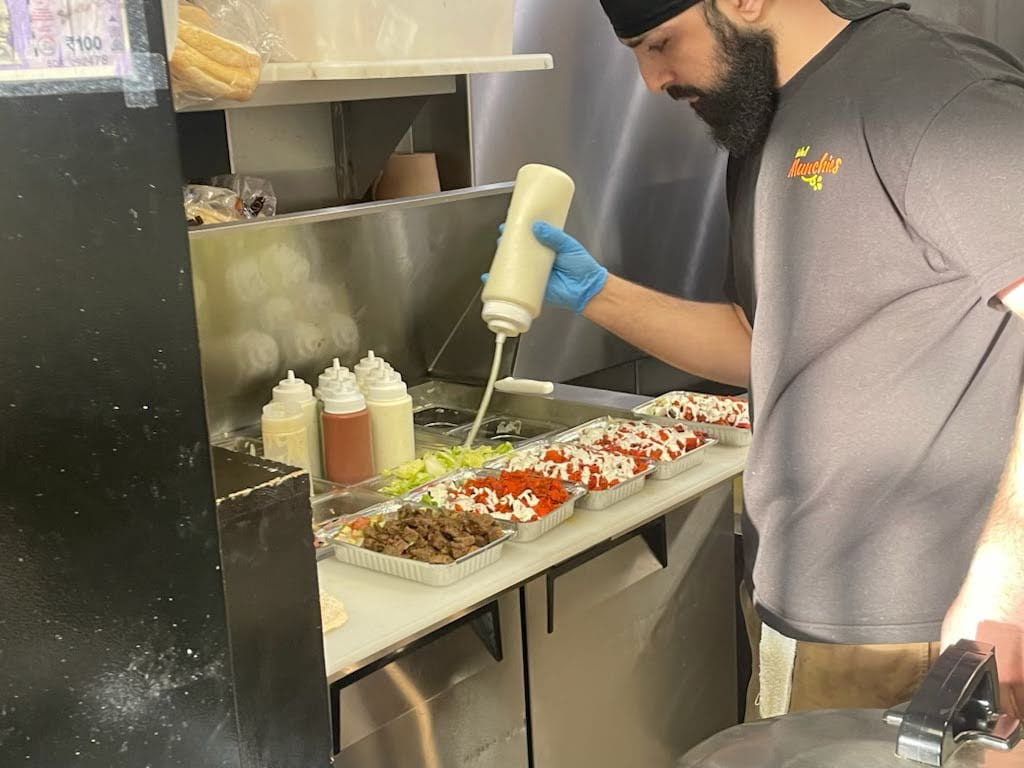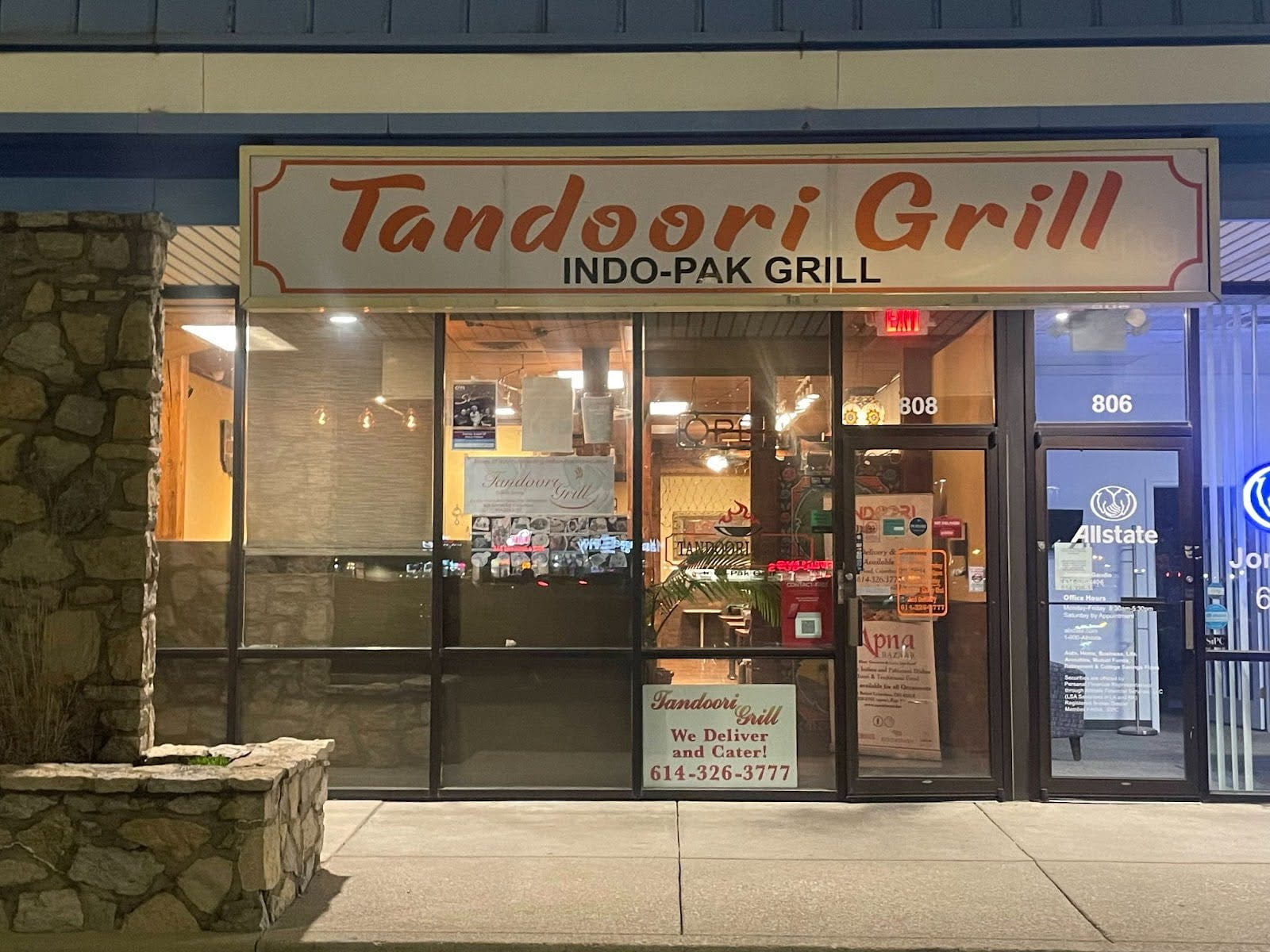
An employee at Halal Munchies drizzles white sauce over chicken and lamb platters on Feb. 28. Credit: Raghav Raj | Lantern Reporter
As the sun begins its descent into the horizon during Ramadan, the employees at Lávash Café in Clintonville ready themselves for the dinner rush.
Ramadan is the Muslim holy month, marked by daily fasting from dawn to sunset, ending with the Islamic holiday of Eid al-Fitr. For Muslim-owned restaurant Lávash Café, Ramadan — which began March 10 and ends April 9 — brings a faithful crowd ready to break its fast after sunset with the cafe’s Mediterranean fare, including falafel, kebabs and shawarma, co-owner Jamal Latif said.

An employee at Lávash Café slices shawarma meat off of a spit on March 7. Credit: Raghav Raj | Lantern Reporter
Suhoor is the pre-dawn meal prior to the beginning of the daily fast during Ramadan, though Latif said his crowd is often seeking iftar, or the breaking of the daily fast.
“Basically, from 30 minutes before iftar to the restaurant closing, it’s chaos,” Latif, who founded Lávash with his father Nasir in 2008, said. “We’ll have students from out of town that are practicing Muslims, and we’ll have groups come in with like 20 people. It’s almost like people are coming over to somebody’s house.”
As observant Muslims across the world abstain from eating and drinking between dawn and dusk, one might assume business is slow during Ramadan for the Muslim-owned eateries serving halal — Arabic for permitted or lawful, used to describe foods allowed under Islamic dietary laws — food around Ohio State’s campus.
For local eateries like Lávash Café, Halal Munchies and Tandoori Grill, however, the ninth and holiest month of the Islamic lunar calendar is one of the most hectic times of the year.
Located at 2422 N. High St., Halal Munchies is a New York City-style, takeout-only spot that serves dishes like gyros and rice platters. Owner Kasim Hashimi said during Ramadan, the restaurant’s lines start forming up to an hour before the sun goes down.
Since his storefront opened in September 2022, Hashimi said Halal Munchies has been especially popular during Ramadan because of its late-night hours.
“On weekdays, we’re open till 2 a.m., and on weekends we’re open till 3 a.m.,” Hashimi said. “So people come and get their iftar meals, but then they also come in and get their meal for suhoor, before sunrise.”
Tandoori Grill is a Pakistani restaurant serving Columbus’ Northwest neighborhood at 808 Bethel Road since 2011, owner Syed Abbas said. He said he starts preparing dishes for iftars like samosas, pakoras and raita in the daytime while he fasts, all in anticipation of the eatery’s nightly rush.

The storefront of Tandoori Grill on 808 Bethel Road on March 7. Credit: Raghav Raj | Lantern Reporter
“We absolutely get a lot busier when Ramadan begins,” Abbas, who also owns the neighboring halal grocery store Apna Bazaar, said. “A lot of people come into our store to buy food to break the fast, they go to pray, then they come back to eat dinner afterwards.”
Ramadan does not only bring an uptick in customers at local restaurants. Mediterranean Foods Imports, a halal grocery store located at 2647 N. High St. that sells goods like fresh feta and olives alongside prepared foods like pita and falafels, also experiences this phenomenon, owner Tarek Kweik said.
“For the first couple weeks of Ramadan, the store gets pretty busy,” Kweik said. “When they do iftar at the mosque, different people will reach out to us, and we donate to them things like water or dates.”
Latif said Lávash Café focuses on philanthropy year-round, and Ramadan is no exception. In particular, he said the restaurant allocates a “big portion” of its budget toward food donations to local mosques, student organizations and nonprofits.
“With Ramadan, the charity aspect is built into treating people with kindness, treating them the way you want to be treated — the golden rule,” Latif said. “It’s not only a main tenet of Islam, but of most other religions, and we try to keep that mentality going throughout the year.”
Hashimi said despite Halal Munchies’ smaller physical size, he’s proud of the community outreach his restaurant has been able to accomplish.
“We know we’re not that huge,” Hashimi said. “But when students and community members reach out to us, we try to give as much as we can.”
For Tandoori Grill, which makes special meal packages and drinks for iftar, Abbas said he and the restaurant engage with donations this time of year by catering meals at his local mosque.
“A lot of people do charity and give free food to others during Ramadan,” Abbas said. “This is a charitable month. It’s an opportunity to collect yourself together and focus on building up the soul.”


